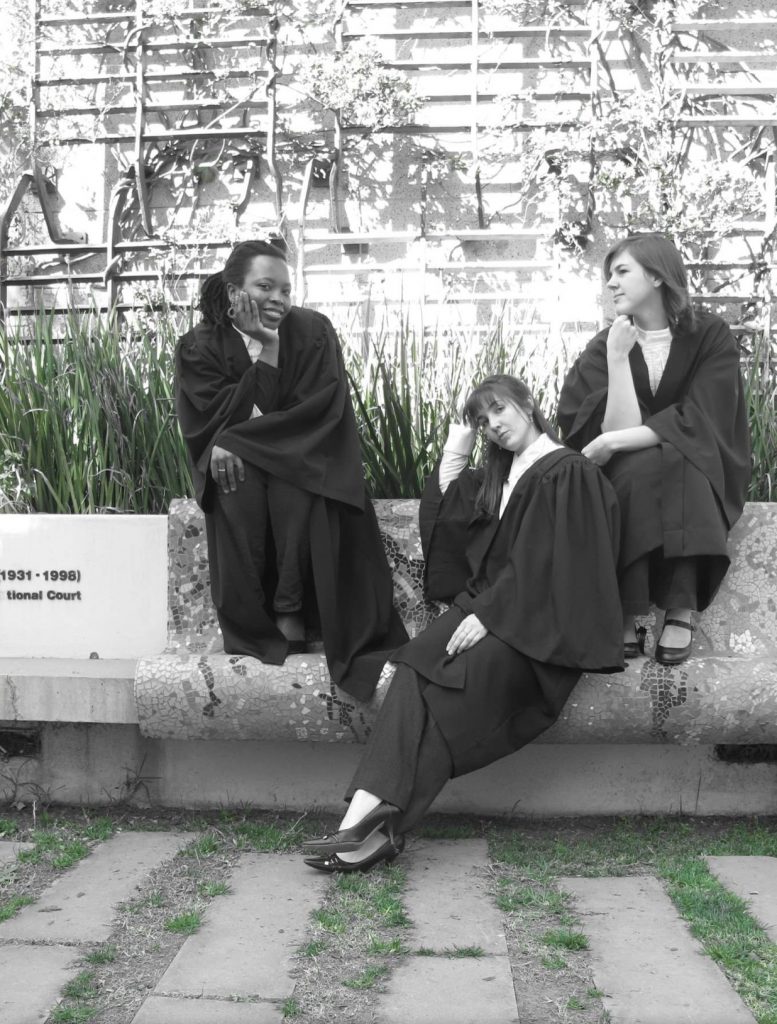What is the role
of the law clerks?
Applying to be a law clerk
Each year the Constitutional Court calls for applications from suitably qualified candidates and receives on average over 300 applications from local and international candidates. Traditionally the incumbent law clerks are tasked by their judges to go through the applications and shortlist about 10 candidates for interviews. Each judge will interview on average 3 to 10 candidates and ultimately appoint about two law clerks.
The clerkship tenure
The appointment of law clerks is staggered. Some law clerks are appointed in January and others in June. Regardless of the appointment date, the duration of the clerkship is for one year. The idea behind staggering the appointments is to ensure that there are always more experienced law clerks who can help train the newer appointees.
Law clerk duties
The law clerks are involved in every step of a case:
Applications: The law clerks initially receive a new application from the Court’s administrative office. They will read each application and compile a brief note to their respective judges on the issues and their opinion of whether the matter should be set down for hearing. The judge will take the law clerk’s opinions into account when they ultimately vote with the other judges on whether a matter should be set down or not.
After a matter is set down for hearing: The law clerks assist their judges with preparation for the hearing. This means going through the case record thoroughly and conducting the necessary research.
On hearing day: The law clerks must prepare their judges material for court and take comprehensive notes during the hearing.
Following the hearing: The judges and their law clerks in each chamber deliberate the outcome of the case based on the arguments presented during the hearing. Once their respective judges have decided on how they will vote, the law clerks assist their judges with the judgment writing process. It is the law clerks’ responsibility to ensure that each judgment is perfectly referenced, punctuated and well researched. They thoroughly check the accuracy of the references used in the judgment to support each assertion that is made in the text.
The exciting part of the job is attending court hearings, where we get to listen to arguments from Counsel. Our own candid discussions with Justices when they draft judgments is hugely rewarding as we are able to express our opinions on the matter and contribute to the judgment through these interactions. Working collectively as a court allows us to produce the best work possible. Collegiality is the most noticeable quality amongst the clerks, we all feel like our opinions matter.
Lwando Xaso
former law clerk to Justice Edwin Cameron
The value of a law clerk
During the Court’s term, law clerks are expected to dress more smartly than when the Court is out of session. On hearing days, clerks are required to wear a black skirt or trousers and a white shirt. Keeping a white shirt in their offices permanently is highly recommended for law clerks since there are times when the Court convenes with little or no warning.
I have been blessed with wonderful, committed and dedicated law clerks which any judge could wish for. I look for commitment. I look for hard work. You must be a good researcher, you must be able to identify issues, you must be able to deal with the issues.
Justice Sisi Khampepe
I mean, if you look and listen to our clerks, you look at the diversity among the clerks, I think the Court is leading by example as to how we should live as decision maker in the judiciary and role modelling in terms of leading in this branch of government.
Justice Bess Nkabinde
Reflections
by law clerks
What I learnt at the Court is that the law ought to be about the people it serves. The learning moment for me was singular: at the end of the proceedings in Moutse Demarcation Forum and Others v President of the Republic of South Africa and Others, Chief Justice Ngcobo addressed the community directly in a language that was more accessible to them – isiZulu.
Nyoko Muvangua
former Law Clerk to Chief Justice Sandile Ncgobo, Justice Froneman and Justice Zondo
Sitting in the Court, observing the community members that have come to hear their story put before this Court for adjudication, changed my understanding of the Constitution. At law school, the Constitution may seem an elite document or a lawyers’ tool that is far removed from everyday realities as academics pour over its abstract meanings. Working at the court has shown me what the Constitution means in the hands of ‘everyday people’.
Claire Avidon
former law clerk to Justice Edwin Cameron


